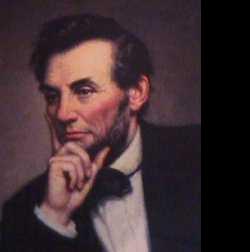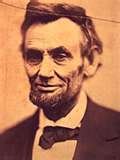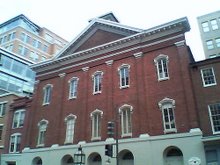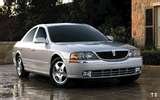
The Cooper Union Address was among the earliest of Lincoln’s speeches denouncing slavery and its expansion into Western territories. Not as popular as his other writings because of its length and detailed examination of the Constitution (Herndon compared it to a lawyer’s brief), it is perhaps the least understood, yet most politically crucial speech of Lincoln’s career.
In it, Lincoln examines the views of the 39 signers of the Constitution and notes that a majority of 21 of them believed Congress should control slavery in the territories, not allow it to expand.
In it, Lincoln examines the views of the 39 signers of the Constitution and notes that a majority of 21 of them believed Congress should control slavery in the territories, not allow it to expand.
Exposing the inconsistent positions of Senator Stephen Douglas and Chief Justice Roger Taney, Lincoln urges fellow Republicans not to give in to Southern demands to recognize slavery as being right, but to "stand by our duty, fearlessly and effectively."
Though he delivered the speech in February of 1860, Lincoln accepted the invitation to write it in October of 1859. It was originally intended to be a lecture at Henry Ward Beecher’s Church in Brooklyn, but the Young Men's Republican Union, which assumed sponsorship, moved its location to the Cooper Institute by the time Lincoln arrived in New York.
The Union Board included members such as Horace Greeley and William Cullen  Bryant, who opposed William Seward for the Republican Presidential nomination. As an unannounced presidential candidate, Lincoln attracted a capacity crowd of 1,500 curious New Yorkers.
Bryant, who opposed William Seward for the Republican Presidential nomination. As an unannounced presidential candidate, Lincoln attracted a capacity crowd of 1,500 curious New Yorkers.
 Bryant, who opposed William Seward for the Republican Presidential nomination. As an unannounced presidential candidate, Lincoln attracted a capacity crowd of 1,500 curious New Yorkers.
Bryant, who opposed William Seward for the Republican Presidential nomination. As an unannounced presidential candidate, Lincoln attracted a capacity crowd of 1,500 curious New Yorkers.Though Lincoln disappointed spectators at first with his almost too-tall appearance, he soon electrified the crowd with his passion for all things anti-slavery. Some recognize that the long road to emancipation, which ended January 1, 1863, began here, February 27th, 1860, at Cooper Union.









No comments:
Post a Comment